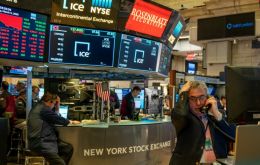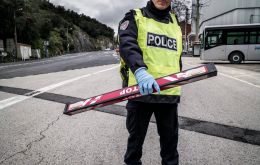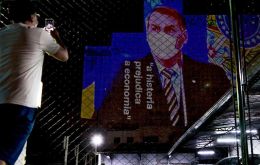MercoPress. South Atlantic News Agency
Tag: COVID-19
-
Saturday, March 28th 2020 - 08:34 UTC
S&P downgrades Mexico and oil giant Pemex credit ratings

S&P downgraded Mexico’s credit rating on Thursday as the coronavirus pandemic and a hit to state oil firm Pemex from plunging crude prices battered the growth outlook and piled pressure on the government to lift the struggling economy.
-
Friday, March 27th 2020 - 09:08 UTC
World leaders pledge US$ 5 trillion to address the global economic collapse

World leaders on Thursday promised US$5 trillion to stave off global economic collapse from the coronavirus pandemic that has killed 21,000 people and shut down huge swathes of the globe.
-
Friday, March 27th 2020 - 09:01 UTC
Nothing to celebrate on the 25th anniversary of the EU open border Schengen agreement

The European Union marked the 25th anniversary of its open-border Schengen agreement on Thursday with all its land borders shut or subject to heavy checks imposed in an effort to curb the spread of the coronavirus.
-
Friday, March 27th 2020 - 09:00 UTC
Pandemic: Falklands government financial support for employers and employees

The Falkland Islands government, FIG, announced this week an initial range of measures aimed at supporting employers and ensuring employees and self-employed continue to receive pay if they have to self-isolate due to Coronavirus.
-
Friday, March 27th 2020 - 08:59 UTC
Falklands suspends schools, nurseries and play-parks until 4 May

The Falkland Islands government, FIG, is stepping up its response measures to COVID- 19 after it was confirmed that the King Edward Memorial Hospital (KEMH) is currently treating a critically ill child. Chief Executive Barry Rowland said that although it has not been confirmed, it is suspected that the child has contracted Coronavirus. Under the new phase of the response, schools, nurseries, and play-parks will close as of Friday 27 March and will not re-open until at least the start of the new term on 4 May.
-
Friday, March 27th 2020 - 08:51 UTC
Britain has ordered 10.000 ventilators from vacuum cleaner company Dyson

Britain has placed an emergency order of 10,000 ventilators designed at breakneck speed by bag-less vacuum cleaner company Dyson, the first fruits of an industry-wide call to arms to prepare for the looming peak of the coronavirus outbreak.
-
Friday, March 27th 2020 - 08:51 UTC
British charity and scientists training dogs to help detect Covid 19

A British charity has teamed up with scientists to see whether dogs could help detect COVID-19 through their keen sense of smell, they said on Friday. Medical Detection Dogs will work with the London School of Hygiene and Tropical Medicine (LSHTM) and Durham University in northeast England to determine whether canines could help diagnoses.
-
Thursday, March 26th 2020 - 18:53 UTC
IATA: Airlines need $US200 billion in liquidity to face “apocalypse”

As passenger demand evaporated around the world due to the COVID-19 pandemic, the International Air Transport Association (IATA) has warned airlines are fighting for survival. The airline association stated that airlines need $US200 billion in liquidity support as they face “apocalypse now.”
-
Thursday, March 26th 2020 - 08:55 UTC
Bolsonaro clashes with governors over lockdowns: “they are destroying Brazil”

President Jair Bolsonaro on Wednesday blasted as criminals the governors and mayors of Brazil’s largest states and cities for imposing lockdowns to slow the coronavirus outbreak, as tensions with his health minister simmered. The death toll rose to 57 from 46 while confirmed cases rose to 2,433 from 2,201 the day before.
-
Thursday, March 26th 2020 - 08:44 UTC
South American countries agree to ensure smooth flow of goods and food supplies in the region

Agriculture ministers from various South American countries participated in a video conference on Monday, March 23, to discuss harmonization of standards and ensure the smooth flow of goods and food supplies throughout the region during the Coronavirus pandemic.
